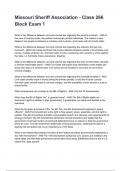Missouri Sheriff Association - Class 266
Block Exam 1
What is the difference between civil and criminal law regarding the persons involved. - ANS In
the case of civil law cases, the parties involved are private individuals. This means a case
between two people or between a company and a person. Civil cases will not include state.
What is the difference between civil and criminal law regarding the action(s) that get one
involved? - ANS Civil cases are those that involve disputes between people or businesses over
money, custody, property, etc. Criminal cases involve a person(s) who commits a crime against
the state, i.e. homicide, fraud, possession. stealing.
What is the difference between civil and criminal law regarding the level of information required
to find the responsible party? - ANS Civil cases will require less information as the stakes are
lesser than that of a criminal case. Civil cases can be handled in court and do not involve
criminal charges.
What is the difference between civil and criminal law regarding the potential penalties? - ANS
Civil cases usually result in money being the primary penalty, could also include custody.
Criminal cases can/will result in criminal charges, and the probability of time served in a jail or
prison facility.
What Amendments are included in the Bill of Rights? - ANS The first 10 Amendments.
What does the Bill of Rights "do", in general terms? - ANS The Bill of Rights spells out
American's rights in relation to their government. It guarantees civil rights and liberties to the
individual.
What are the basic provisions of the 1st, 4th, 5th, and 6th Amendments applying to peace
officers? - ANS First Amendment is the right to free speech, press, assemble, and the right to
petition. The 4th Amendment prohibits unreasonable search and seizures, sets requirements for
issuing a warrant. The 5th Amendment addresses criminal procedure and states that the
government must bear burden of proof and defendants have no reason to help the government
prove it's case. The 6th Amendment addresses criminal prosecution, declaring the right to a
speedy trial and public trial, by an impartial jury of the State.
What is the relationship between the laws of the Federal and State governments established in
the 14th Amendment? - ANS The 14th Amendment stated that U.S. citizens are entitled to the
same rights and that state government cannot take those away. Established that we are a U.S.
citizen first, state second.
, What is the effect of the 14th Amendment on the average citizen in terms of citizenship and
legal expectation? - ANS The 14th Amendment set forth that all persons born or naturalized in
the United States, and subject to the jurisdiction thereof, are citizens of the United Sates and of
the state wherein they reside. No state shall make or enforce any law which shall abridge the
privileges or immunities of citizens of the United States; nor shall any state deprive any person
of life, liberty or property, without due process of the law.
What effect does the 14th Amendment have on law enforcement officers? - ANS The 14th
Amendment and your right to due process sets there must be some fair procedure owed if an
officer confiscates your possession(s).
Identify the 3 branches of the United States government. - ANS Legislative, Judicial, and
Executive.
In what branch of government do peace officers apply to, and what difficulties does this create. -
ANS Law enforcement applies to the executive branch in charge of enforcing the laws. The
difficulties within the separate branches are the checks and balances in place, not one branch
has more power than the next and all must agree in order for an action to go through.
What are the relationship between rights in remedies? - ANS In the case that someone's rights
were infringed upon, there must be a remedy in place to amend.
What is the role the Exclusionary Rule plays in protecting someone's Constitutional Rights and
those of other citizens? - ANS The Exclusionary Rule prevents the government from using
evidence gathered in violation of the United States Constitution; therefore, if evidence is gained
unlawfully it will not be admissible in court.
Identify each point of the criminal process. - ANS Probable cause, contact, detention, arrest,
24-hour hold, prosecutor's action, arraignment, preliminary hearing, pre-trial motions, trial,
sentence.
Identify what booking is and explain why it is done. - ANS A procedure after arrest to learn more
factors about the arrestee; states charges, I.D., keeps track of belongings.
What is required by the Missouri 24-Hour Rule? - ANS Missouri's 24-Hour Rule states that a
subject can be held, with probable cause, for up to 24 hours without charges while an
investigation is done and the prosecuting attorney decides on charging.
What are the 4 actions a prosecutor may take when an arrest warrant application is made and
reasons why each action is taken. - ANS A prosecuting attorney can either issue a warrant,
refuse charging, take under advisement, or send to a Grand Jury within the 24-Hour period.
What is a Grand Jury? - ANS A Grand Jury, more than 12 but limited to 23 jurors, selected to
examine the validity of an accusation before trial.




